2013.04.02 CoStone Capital 浏览次数:
CoStone Annual Meeting 2013 took placeatthe Interlaken OCT Hotel,Shenzhen, Guangdong on March 30 and 31,2013.
April 1, 2013
With the theme of "Transformation", the meeting offered a platform for CoStone Capital's investors to discuss hot topics with experts in economics, sociology and management. Nearly 300 investors, representatives of CoStone network companies and elites from various circles attended the meeting.
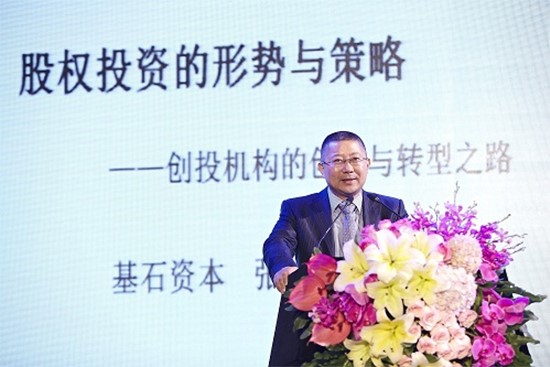
Zhang Wei on the Situation and Strategies of Equity Investment
At the meeting, Chairman Zhang Wei delivered a keynote speech on the situation and strategies of equity investment. He said, "CoStone Capital is optimistic about the long-term economic development of China. A dramatic plunge will not occur. The government has provided strong support for the social and economic development in China. Moreover, active private sectors also boast numerous investment opportunities." "The VC investment sector experienced great challenges in 2012. As the asset management industry is booming, VC investors need to develop more businesses and diversify their business modes and investment methods, so as to improve the service value chain and their risk resistance capacity and profitability," suggested Zhang Wei.
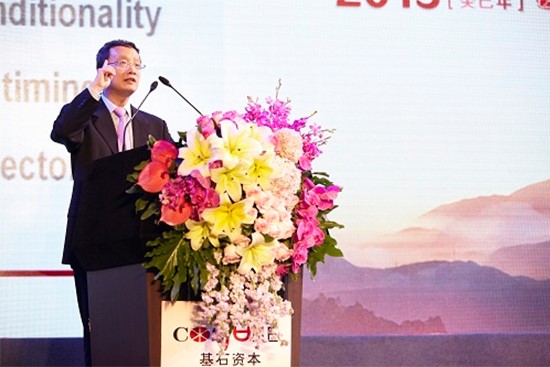
Dr. Tao Dong making a speech
The international and domestic macro-economic situation is one of the topics most concerned by people. Dr. Tao Dong, Managing Director and Vice Chairman of Credit Suisse Private Banking Asia Pacific, offered his insights into China's systematic reform, real estate market and industrial structure. As he pointed out, to increase productivity, China needs a structural and systematic reform, including allowing private capital to enter the service sector, and breaking up monopolies in the banking sector, eliminating the Hukou system, and activating the 500 million rural consumers.
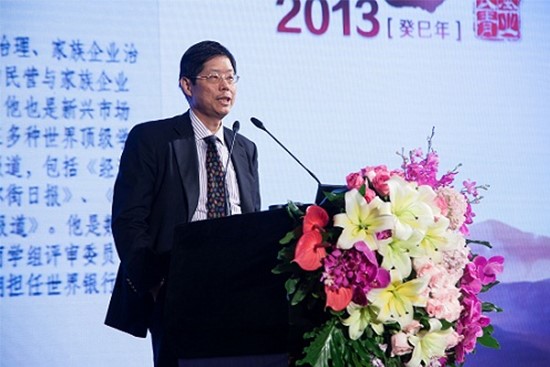
Prof. Joseph Fan making a speech
Professor Joseph Fan at the Chinese University of Hong Kong (CUHK) is an expert in the governance and inheritance of family businesses run by Chinese. He talked about the how to maintain the sustainable development of a family business. Based on the experience of Chinese family businesses in Southeast Asia and the West, Prof. Fan proposed new management modes other than the traditional one in which heirs to the family businesses have the ownership of special assets and professional managers are hired to manage them. He also explored the internal governance structure of family businesses from a unique perspective.
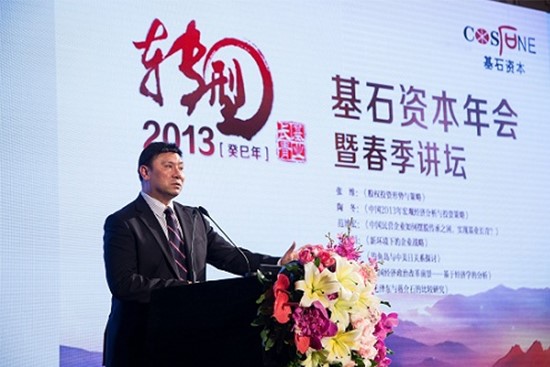
Prof. Terence Tsai making a speech
Prof. Terence Tsai at China Europe International Business School (CEIBS) proposed the strategies companies should adopt in the new context and offered suggestions for them on how to identify the key external influential factors. The issue of Chinese companies’ internationalization was also discussed in his speech.
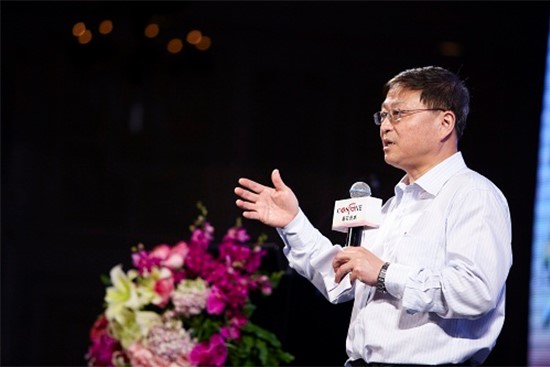
Prof. Yan Xuetong making a speech
The Sino-Japanese relations and the Diaoyu Islands dispute, which are of the public's concerns, have caused heated debates over the past two years. Professor Yan Xuetong, China's most renowned expert in international relations, shared his wisdom on the two issues.
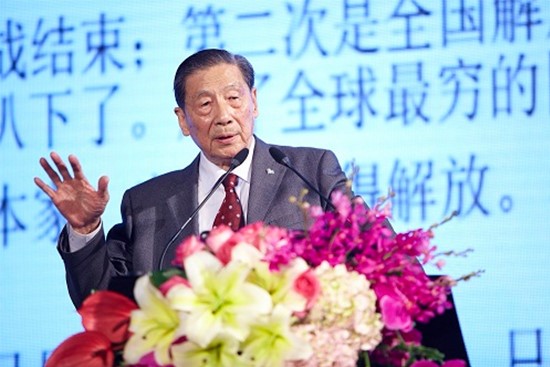
Mao Yushi making a speech
Mao Yushi, the winner of Milton Friedman Prize for Advancing Liberty, shared his research outcomes on China's economic prospects and government reforms at the meeting. As he pointed out, the past 30 years have been the prime period in modern China, but there remain a lot to be reformed. China needs to go on advancing social equity. Many attendees were inspired by his academic ideas.
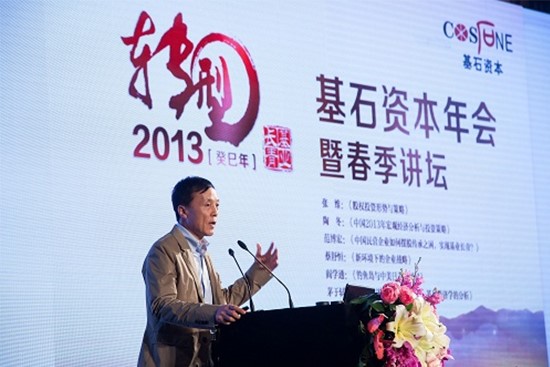
Prof. Yang Kuisong making a speech
Professor Yang Kuisong is a famous Chinese historian, with in-depth research on the history of the Communist Party of China, Sino-foreign relations and modern China. His comparative study of Chiang Kai-shek and Mao Zedong is quite refreshing. The two great men, traditionally viewed as enemies, are found with common features in many aspects in Prof. Yang's study.
Speaker
Dr. Tao Dong
Dr. Dong Tao, highly regarded by investors worldwide, is Managing Director and Vice Chairman of Credit Suisse Private Banking Asia Pacific. He has published more than ten books in his careers. Dr. Tao joined Credit Suisse in 1998 as Chief Regional Economist for Non-Japan Asia, with a focus on China. He moved from investment bank to private bank in July 2016. Prior to joining Credit Suisse, he was with Schroders Securities Asia as Senior Regional Economist and Head of China research. Dr. Tao holds a PhD degree and a master's degree from the University of Utah and a bachelor's degree from Beijing Foreign Language University. He worked in China, the US and Japan. He has been based in Hong Kong since 1994.
Prof. Joseph Fan
Joseph Fan is Professor of School of Accountancy and Department of Finance of CUHK. He holds a PhD in Finance from University of Pittsburgh, US, and a bachelor's degree in Economics from National Taiwan University. Before joining CUHK in 2004, he was on faculty of the Hong Kong University of Science and Technology and the University of Hong Kong.
Prof. Terence Tsai
Terence Tsai is Associate Professor of Management at CEIBS and PhD Supervisor at Shanghai Jiaotong University in China. He has also served as Visiting Professor of Management at National Taiwan University, Chang Gung University and Sun Yat-Sen University in Taiwan. Prior to joining CEIBS, he served as Acting Associate Dean (Graduate Studies), Director of Centre for Case Teaching and Research and Acting Director & Associate Director of MBA Programmes at CUHK. Dr. Tsai was also a full-time faculty member of Richard Ivey School of Business at the University of Western Ontario in Canada and Judge Business School at the University of Cambridge in England.
Prof. Yan Xuetong
Yan Xuetong is President of the Carnegie–Tsinghua Management Board and Dean of Tsinghua University's Institute of Modern International Relations. Prof. Yan is Editor-in-chief of the Chinese Journal of International Politics and serves as an adviser to several leading academic journals. He is Vice Chairman of both the China Association of International Relations Studies and the China Association of American Studies, and is a member of the Consultation Committee of China's Ministry of Commerce. He also serves on several boards, including those of the China Diplomacy Association and the China Association of Foreign Friendship. Prof. Yan has written several books, including Analysis of China's National Interests, winner of the 1998 China Book Prize, Ancient Chinese Thought, and Modern Chinese Power.
Prof. Mao Yushi
Prof. Mao Yushi is a Chinese economist. He graduated from Shanghai Jiao Tong University in 1950. He was a visiting scholar at Harvard University in 1986 and a senior lecturer at Queensland University in 1990.
Prof. Yang Kuisong
Prof. Yang Kuisong is a Chinese historian. His studies the history of the Chinese Communist Party. He is Professor of History at the East China Normal University, a researcher at the Si-Mian Institute for Advanced Study in Humanities. He also holds a position as a professor at Peking University. His research focuses on the history of modern China, the history of the Chinese Communist Party, Sino-Soviet relations, the relationship between the Kuomintang and the CPC, and the intellectual history of socialism.
Rewritten by: Jiang Xiaomei, Edited by: Du Zhixin, Li Yunzhen
几年前,我曾提出一个问题:中国经济繁荣的根基是什么?
我认为是“重商主义(这里借指市场经济)”与“儒家文化”这两个因素的核聚变,只要我们的体制大门开一条小小的缝,中国老百姓与生俱来的聪明、勤奋、奋不顾身,几千年穷怕了的物质主义和实用主义,就能创造一个新天地。
2021年,我见到一个新能源公司的董事长,谈及张维迎所言“直到20世纪70年代,绝大部分中国人的生活水平不比唐宋时期好多少”,他说这是真的,1978年他没有见过电,全家所有家当是一个小木柜。1979年,我的好朋友,一个咨询集团的董事长考上了大学,报到前他勤工俭学,骑六七十里山路卖冰棍,山里的一户人家,用几个鸡蛋和他换了一根,全家人排成一排每个人吮吸一囗。
在改革开放前,这是中国普遍的景象。而我们这一两代人,在改革开放后,怀抱着对美好生活的向往,创造了人类发展史上的奇迹。40多年过去,我们看到,轻舟已过万重山。伟大的中国工业革命,怎么赞扬也不为过!
而另一方面,中国用几十年的时间,走完了发达国家几百年的路,这也就注定了,我们上山的道路,更加的陡峭。同时,中国作为一个有几千年历史的古国,其发展正常就是“孔雀东南飞,五里一徘徊”。作为一个新兴经济体,我们讲究的是实用主义,中国的政策也是因时、因势而变的。
因此,并非一些简单的因素就能够遏制中国的增长,只要不出现战争这样会扰乱经济进程的极端因素,只要中国依然坚定地支持民营经济发展,保护企业家精神,中国经济的前进步伐就是坚定不移的。
如果认同这一点,那么无论是短期的政策、市场变化还是长期的中美对抗,都不会让我们产生太大的焦虑。
具体从我们做企业和做投资来讲,也无需过度悲观。“沉舟侧畔千帆过,病树前头万木春”,在一些行业和企业衰落的同时,也永远有一些行业和企业在崛起。
以半导体产业为例,我们不必纠结于半导体仿佛一年紧缺、一年过剩,因为问题的核心不是这个。问题的核心是第四次工业革命离不开半导体技术,而中美对峙、科技封锁,将进一步迫使中国在所有科技领域谋求自主可控,进一步迫使中国以举国体制解决创新问题。同时,当一项投资吻合科技进步趋势和政策引导的双重影响时,其估值亦将脱离传统财务模型。这些才是中国硬科技投资的重要的底层逻辑。
看待资本市场,我们更不必计较一时的股价波动。回顾历史,在资本市场发生剧烈调整时,那些优质的企业往往也会出现大幅下跌,但不同的是,优秀企业不仅能收复失地,还能再攀高峰。因此,我们继续坚定地布局那些有核心技术、有企业家精神的企业。而从我们的投资经历来看,那些有企业家精神的企业最终都带领我们穿越了周期,并获得了异乎寻常的回报。
莫愁前路无知己,天下谁人不识君!